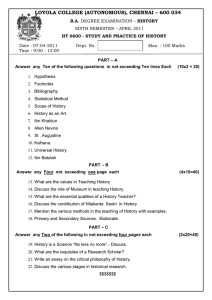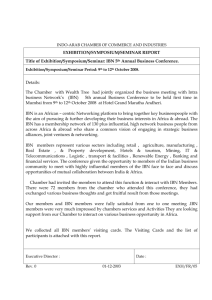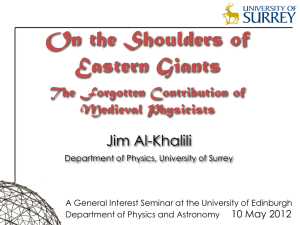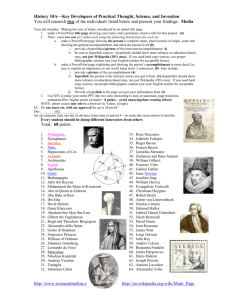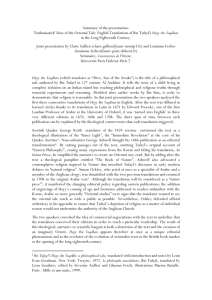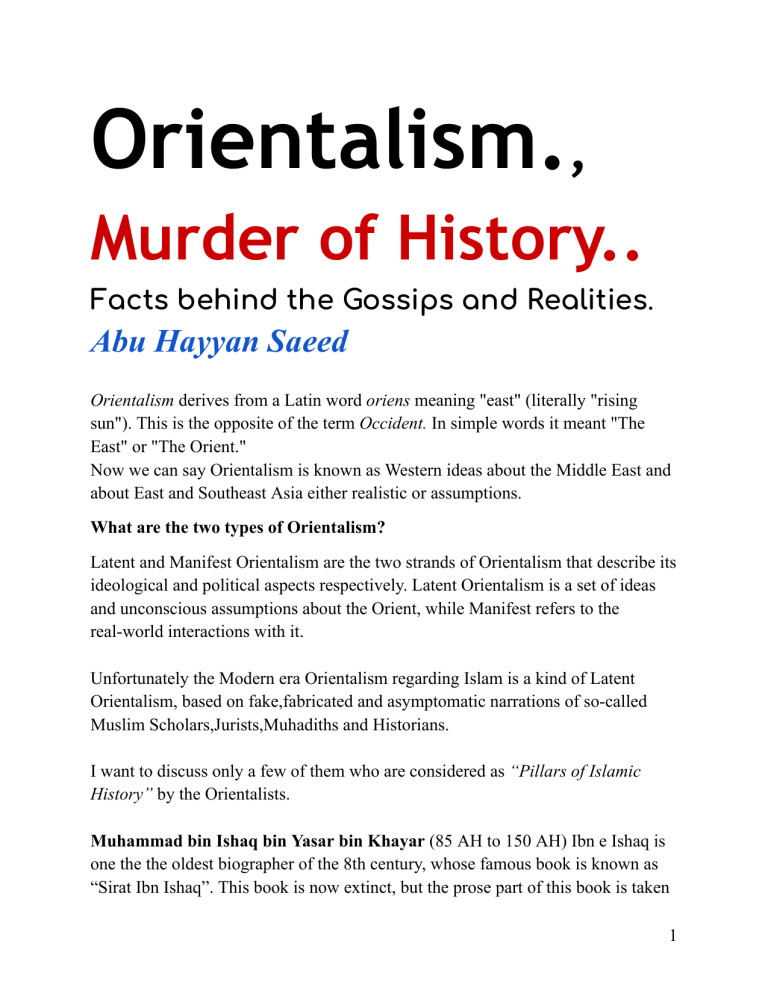
Orientalism., Murder of History.. Facts behind the Gossips and Realities. Abu Hayyan Saeed Orientalism derives from a Latin word oriens meaning "east" (literally "rising sun"). This is the opposite of the term Occident. In simple words it meant "The East" or "The Orient." Now we can say Orientalism is known as Western ideas about the Middle East and about East and Southeast Asia either realistic or assumptions. What are the two types of Orientalism? Latent and Manifest Orientalism are the two strands of Orientalism that describe its ideological and political aspects respectively. Latent Orientalism is a set of ideas and unconscious assumptions about the Orient, while Manifest refers to the real-world interactions with it. Unfortunately the Modern era Orientalism regarding Islam is a kind of Latent Orientalism, based on fake,fabricated and asymptomatic narrations of so-called Muslim Scholars,Jurists,Muhadiths and Historians. I want to discuss only a few of them who are considered as “Pillars of Islamic History” by the Orientalists. Muhammad bin Ishaq bin Yasar bin Khayar (85 AH to 150 AH) Ibn e Ishaq is one the the oldest biographer of the 8th century, whose famous book is known as “Sirat Ibn Ishaq”. This book is now extinct, but the prose part of this book is taken 1 in “Sirat Ibn Hisham”. His ability of history telling orally without proofs was famous ,his narrations considered as the oldest pan of Islamic history. Muhammad ibn Umar ibn Waqid (130AH ~207 AH ) known as " Al-Waqidi " was a Muawla( free slave ) of Banu Aslam of Madina.Al-Waqidi is primarily known for his Kitab al-Tarikh wa al-Maghazi (Arabic: كتاب التاريخ والمغازي, "Book of History and Campaigns"), which is the only part of his corpus that has been fully preserved but all of the stories are Oral tales.Historian Patricia Crone gives al-Waqidi as an example of the phenomenon whereby the farther an Islamic commentary on Muhammad's life was removed in time from his life and the events in the Quran, the more information it provided.Her words are, “If one storyteller should happen to mention a raid, the next storyteller would know the date of this raid, while the third would know everything that an audience might wish to hear about”. Kindly read and think over the under line words of Patricia Crone “ while the third would know everything that an audience might wish to hear about”, that means the storyteller must aware the mindset of his audience and this mindset is hungry of thrill,fantasy,magical tales, imaginative stories ,excitement etc. The Orientalists accept al-Waqidi as a reliable and valuable source for the life of the Prophet and for the period immediately following the death of the Prophet, whereas Muslim scholars, by and large, are not prepared to give him a rank more than a story-teller in the court of the Baramikah. All Orientalists considered him a pillar in history and accepted his narrations in this regard , Let us Know what the Muslim Scholars told about Waqidi.. Imam Al-Sha’fi (d. 204 A.H.) said "All the books of al-Waqidi are lies. In Medina there were seven men who used to fabricate authorities, one of which was al-Waqidi." Ahmed Bin Hambal , (d. 241 A.H.) said "He is a liar, makes alternations in the traditions. Al-Nisa’i , (d. 303 A.H.) said "The liars known for fabricating the hadith of the Messenger of Allah are four. They are: Arba’ah b. Abi Yahya in Medina, al-Waqidi in Baghdad, Muqatil b. Sulayman in Khurasan and Muhammad bin Sa’id in Syria. 2 Yahya bin Moeen , (d. 233 A.H.) said "He is weak. He is nothing. Not reliable. Ishaq bin Rahwaya , (d. 238 A.H.) said "According to my view, he is one of those who fabricate Hadith. Ali Al-Madini , (d. 241 A.H.)said "He fabricated Hadith. Abd al-Malik bin Hisham al-Hamiri (d: 218 AH ) known as " Ibn e Hisham " ,was a famous Muslim historian and Muhadith who was born in Basra and died in Fustat (Egypt). He was a famous historian and grammarian. He wrote the biography of the Messenger of Allah, which is known as the biography of Ibn Hisham (Sirat Ibn e Hisham). He compiled this book with the help of Ibn Ishaq's book Al-Maghazi wa Al-Sir. Later Ibn Hishām's As-Sira would chiefly be transmitted by his pupil, Ibn Baqqa'i.This treatment of Ibn Ishāq's work was circulated to scholars in Cordoba in Islamic Spain. The first printed edition was published in Arabic by the German orientalist Ferdinand Wüstenfeld, in Göttingen (1858-1860). The Life of Moḥammad According to Moḥammed b. Ishāq, ed. 'Abd al-Malik b. Hisham. Gustav Weil (Stuttgart 1864) was the first published translation. In the 20th century the book has been printed several times in the Middle East. [18] The German orientalist Gernot Rotter produced an abridged (about one third) German translation of The life of the Prophet. As-Sīra An-Nabawīya. (Spohr, Kandern in the Black Forest 1999). An English translation by the British orientalist Alfred Guillaume: The Life of Muhammad. A translation of Ishaq's Sirat Rasul Allah. (1955); 11th edition. (Oxford University Press, Karachi 1996). The main transmitter of Ibn e Hisham is Ziyād al-Baqqāʾi (d. 183), lived mostly in Kufa. Ibn Hishām's knowledge of Ibn Isḥāq's biography derived from al-Baqqāʾi. But unfortunately No one knows more about this person Ziyad al Baqqa’i. Muḥammad ibn Saa‘d ibn Manī‘ al-Baṣrī ( 168 AH ~ 230 Ah known as Ibn Saa'd he spend decades with Al-Waqidi and wrote the narrations of Waqidi that’s why he got nicknamed Scribe of Waqidi (Katib al-Waqidi). He became famous for his compilation of Tabaqat Ibn Saad al-Maharuf Tabaqat al-Kabir. In this book, there are mentions of important personalities from the time 3 of the Holy Prophet PBUH to the time of the Companions and the followers of the author until his own time, and it was used by every new historian. Muḥammad ibn Jarīr ibn Yazid al Tabari(224 ~ 310 AH) He was an Irani historian and scholar from Amol, Tabaristan Northern Iran. His most influential and best known works are his Quranic commentary, known in Arabic as Tafsīr al-Ṭabarī, and his historical chronicle called History of the Prophets and Kings (Tarīkh al-rusul wa-l-mulūk), often referred to as Tarīkh al-Ṭabarī ("al-Tabari's History"). He narrates fake and bogus history of the wars between the Companions of the Prophet (may Allah be pleased with him) in the name of Ju’mal, Siffin, without any evidence. Ibn Jarir al-Tabari narrated and fabricated the stories of Karbala, Muawiya and Yazid etc from doubtful Oral Sources.That’s why Ibn e Jarir Tabri became a Blue-Eyed Boy of Orientalists. Tarikh al-Tabari consists of forty volumes (Original in Arabic) which are easily available. It is written in the beginning in the preface of this book that there is no eyewitness to all the events described in it and all these things have been written only after hearing from people.All Historian after Al-Tabari has been following the foot-prints of him. In Muslim History, I don't know any notable in near past who denies these false and fake stories fabricated by the Iranian mystic Ibn Jarir al-Tabari rather than Ahmed Amin Masri (1886-1954) , Tamanna Emadi Mujeebi (1888-1972) . There is a very huge list of Muslim Historians,Biographers like Khalifa bin khayat ,Ibn e Asir , Al Masudi , Ibn e Asakir , Ibn e Kathir , Al Suyuti ,Ibn e Khaldun etc but the work of them depends on these five person to whom i discussed shortly. Majority of the stories and tales of Western Orientalists are based on their work. Conclusion : I consider Orientalism to be the Murder of Muslim’s History. 4 References: Donner, Fred Mc Graw , Narratives of Islamic origins : the beginnings of Islamic historical writing 1945 ,Published in 1998 , Princeton, N.J. : Darwin Press. Lewis,Bernard & P.M.Holt ,Historians of the Middle East , 1964 ,Oxford University Press,London,New York. Stephen J Shoemaker , The Death of a Prophet: The End of Muhammad's Life and the Beginnings of Islam , 2011 , University of Pennsylvania Press . Patricia Crone , Meccan Trade and the Rise of Islam,1987 ,Oxford University Press. John Pickard, Behind the Myths:The Foundation of Judaism,Christianity and Islam, 2013, AuthorHouse. Coeli Fitzpatrick., Adam Hani Walker , Muhammad in History, Thought, and Culture: An Encyclopedia of the Prophet of God [2 volumes] , 2014 , ABC-CLIO. Vuckovic, Brooke Olson , Heavenly Journeys ,Earthly Concerns, The Legacy of Miraj and the Formation of Islam , Routledge NY & Oxon.. 5
